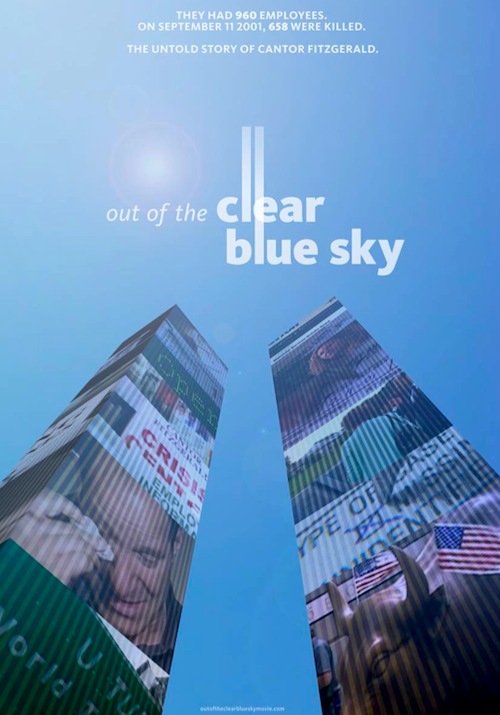By Joe Bendel. A prestigious Wall Street firm specializing in Treasury securities, Cantor Fitzgerald suffered more losses on September 11th than any other organization, including the New York Police and Fire Departments. The numbers are staggering: 658 of their 960 New York employees died that morning. However, Cantor’s story did not end there. Filmmaker Danielle Gardner, whose brother Doug was one of the 658, documents CEO Howard Lutnick’s efforts to support the anguished Cantor families while desperately working to keep the firm afloat during its darkest hours in Out of the Clear Blue Sky (see clip above), which is currently screening as part of the 2012 DocuWeeks New York.
Had it not been the morning of his young son’s first day of school, Lutnick surely would have been at Cantor at the time of the attack. With offices several floors above the initial impact zone, Cantor employees never had a chance. Rushing to the scene only to witness the Towers’ collapse, Lutnick and a handful of senior staff began scrambling to determine who survived. With the enormity of their loss weighing on him, a distraught Lutnick became the public face of the tragedy. Yet, as some family members lashed out Lutnick in frustration, the media turned on Cantor, hard.
 Blue’s stories of grief and remembrance are truly heartrending. Surprisingly, though, it is also a compelling business documentary, providing an inside account of Cantor’s fight to survive during the precarious days following the fateful Tuesday. Their resourcefulness is quite extraordinary, conducting Twenty-First Century financial transactions with scrounged office supplies. Of course, the stakes were high. Had the firm folded, Lutnick’s ability to help Cantor families would have been severely limited. Indeed, that behind-the-scenes look at Cantor’s tenacious rebound is what sets Blue apart and above other well meaning 9-11 documentaries.
Blue’s stories of grief and remembrance are truly heartrending. Surprisingly, though, it is also a compelling business documentary, providing an inside account of Cantor’s fight to survive during the precarious days following the fateful Tuesday. Their resourcefulness is quite extraordinary, conducting Twenty-First Century financial transactions with scrounged office supplies. Of course, the stakes were high. Had the firm folded, Lutnick’s ability to help Cantor families would have been severely limited. Indeed, that behind-the-scenes look at Cantor’s tenacious rebound is what sets Blue apart and above other well meaning 9-11 documentaries.
As a member of their ranks, Gardner clearly earned the trust of Cantor families, eliciting some unusually eloquent testimony from her interview subjects. While there are many emotionally charged scenes, the film never feels intrusive or exploitative. (The only exception might be Lutnick’s tearful television interviews recorded within days of the attack, which have already been replayed innumerable times in the media.) Indeed, Gardner deftly walks the tightrope, directly conveying the rawness of survivors’ pain, without reveling in it.
While the media does not cover itself in glory for uncritically recycling complaints against Lutnick, the overall film is scrupulously nonpartisan. Too many misguided people would prefer to forget or deny the horrific events of September 11th. Worse still, some might even be inclined to dismiss Cantor as an instrument of the “1%” amid the current polarized climate. Blue acts as a valuable corrective to such impulses, reminding viewers the Cantor employees lost at the World Trade Center were all individuals from diverse backgrounds, who left behind friends and loved ones. Poignantly engaging but also quite an enlightening portrait of corporate resiliency, Out of the Clear Blue Sky screens through Thursday (8/16) at the IFC Center in New York, with a week’s run at the Laemmle Noho to follow (8/17-8/23) in Los Angeles, as part of this year’s DocuWeeks.
LFM GRADE: A-
Posted on August 13th, 2012 at 1:39pm.



